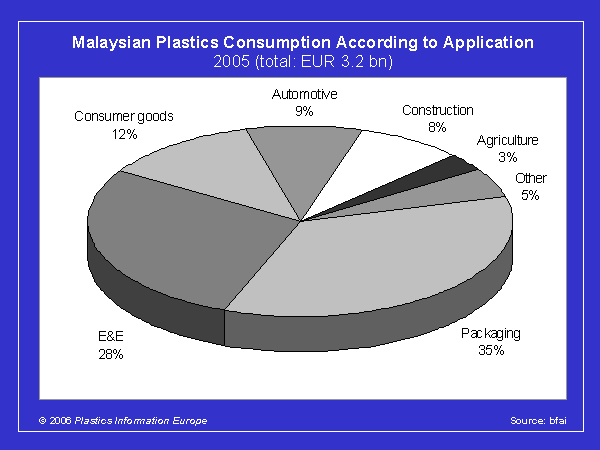MALAYSIA
Plastics industry records significant increase / More foreign investors welcome
The Malaysian plastics industry expects to achieve a double-digit increase in sales in the current year, according to the German Office for Foreign Trade (bfai, Cologne / Germany; www.bfai.de). However, the rise is not expected to be as high as it was in 2005 when local companies managed to raise sales by 22% compared with the previous year to reach the equivalent of EUR 3.2 bn. Sales of plastics products are being inhibited by the price increases due to rising oil prices, says bfai.
According to information supplied by the Malaysian Industrial Development Authority (MIDA; www.mida.gov.my), the country exported products worth MYR 6.5 bn (EUR 1.4 bn) in 2005, which was significantly more than it imported (MYR 4.9 bn). The majority of the imports came from Japan, Singapore, People´s Republic of China, United States and Thailand.
In Malaysia there are around 1,400 plastics converters, of which 900 can be regarded as small and medium-sized enterprises. Approximately 800 of these are in local ownership. The number of employees in this segment is put at around 81,000. According to official figures, the industry contributes 2.7% to gross domestic product. The most important production processes are injection moulding (40%), film extrusion (30%), blow moulding (8%), extrusion of pipes and profiles (7%), foaming and composites production.
According to information supplied by the Malaysian Industrial Development Authority (MIDA; www.mida.gov.my), the country exported products worth MYR 6.5 bn (EUR 1.4 bn) in 2005, which was significantly more than it imported (MYR 4.9 bn). The majority of the imports came from Japan, Singapore, People´s Republic of China, United States and Thailand.
In Malaysia there are around 1,400 plastics converters, of which 900 can be regarded as small and medium-sized enterprises. Approximately 800 of these are in local ownership. The number of employees in this segment is put at around 81,000. According to official figures, the industry contributes 2.7% to gross domestic product. The most important production processes are injection moulding (40%), film extrusion (30%), blow moulding (8%), extrusion of pipes and profiles (7%), foaming and composites production.
 | |
Growing demand for technical thermoplastics
The most important customer industries are plastics packaging with 35% of the total, followed by components for the electrical and electronics industry (E&E) with 28%, and consumer goods (12%). Other customers include the automotive industry (9%), construction (8%) and agriculture (3%), says the bfai. Although the level is still very low, demand is also growing for parts and components for the production of medical equipment and apparatus for the biotechnology industry. Malaysia mainly processes polyethylene, polypropylene, PVC and polystyrene but there is also mounting interest in technical thermoplastics, some of which are available domestically, while others such as polyamide and polycarbonate have to be imported.
Plastics demand in Malaysia in 2005 was around 1.5m t, making the annual per capita consumption of plastics products in Malaysia 55 kg. This is still low compared with developed industrial nations like Germany (160 kg), US (155 kg), Singapore (90 kg) and Japan (87 kg). Nevertheless, it is higher than Thailand, for example, which has 30 kg and the People´s Republic of China with 22 kg, says the bfai. Experts assume that demand will increase in view of upcoming new applications. The high prices have also led to significant interest in recycling activities.
Government hoping for higher investments
The Malaysian government wants to encourage both domestic and foreign investors to manufacture high-precision products with high added value in the country. In the longer term, it is expected that the market share of the packaging segment will decline but that, for example, the proportion of products manufactured from technical plastics will increase. In this way, it is hoped that the domestic industry will develop to a level approaching that in Japan, Korea and Taiwan.
In 2005, the Ministry for International Trade and Industry approved a total of 81 projects in the plastics industry with a value of MYR 1.2 bn. The capital expenditure of domestic companies amounted to MYR 585m, which was similar to the figure for foreign companies (MYR 595m). Just under 50% of the money invested (MYR 591m) went into the 21 projects run by plastics packaging manufacturers.
A further MYR 234m went into projects for consumer and industrial products, MYR 213m into the plastics components sector, MYR 72m into plastics compounds and MYR 50.9m into the recycling of plastics. Significant among packaging investments is the project initiated by Penfibre Film Division (Penang / Malaysia; www.toraypenfibre.com), a subsidiary of the Japanese company Toray Industries (Germany: Neu-Isenburg; www.toray.de), which involves capital expenditures of MYR 345m from Japan, says the bfai. This sum has been earmarked for the future production of PET films.
10.11.2006 Plasteurope.com [206676]
Published on 10.11.2006

 German version of this article...
German version of this article...